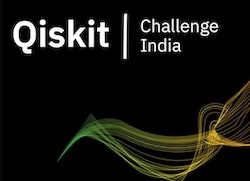IBM India/South Asia Blog
IBM aims to build and grow quantum community in India
A blog by Gargi Dasgupta, Director- IBM Research India and CTO IBM India/ South Asia

Quantum computing as a technology is accelerating at a rapid pace. Accessing the quantum phenomena of superposition, entanglement, and interference, quantum computers process information in a completely different way than classical computers. And as we scale up today’s noisy, small quantum devices, and improve the capability of quantum circuits, the building blocks of quantum applications, we could soon have systems powerful enough to explore potential Quantum Advantages—problems that we can solve more efficiently on a quantum computer than on the world’s best supercomputers. Our scientists at IBM recently unveiled their Quantum Roadmap to reach this point of advantage, and scale today’s devices with tens of qubits, to the million-qubit systems of the future, with a suite of increasingly advanced quantum processors.
While quantum computing’s full potential is still unknown, exploring practical applications and future use cases of quantum computing requires the partnership of businesses and organizations from a variety of industries, academia, and disciplines. Hence, the key to leverage its advantage depends on creating awareness about the technology and also building a pipeline of skilled resources that can make the most of it.
This is why at IBM, we believe that open source access and adoption is how an ecosystem of developers, scientists, educators, and professionals and entire industries can get “quantum ready” to benefit from quantum. Since making the universal quantum computer accessible via the cloud, in 2016, our scientists and engineers have deployed the Qiskit open-source software framework, developed resources from an online, open-source Qiskit textbook, hosted in-person and virtual hackathons, and offered formal educators and researchers programs. And today, we have an active community of more than 250,000 registered users, who have run hundreds of billions of quantum circuits on the world’s largest fleet of quantum computers.
Building and engaging quantum community in India

In India, we have seen strong theoretical work on quantum mechanics being done at different universities across India, for many years now. The announcement of National Mission on Quantum Technologies and Applications, earlier this year, has also given this technology the boost it needed. But for India to continue this progress, and play a leading role in the new quantum industry, more effort is needed to bring together industry, academia, and government. Quantum computing should be ubiquitous in education. From computer science courses to chemistry and business classes, students should become familiar with this technology in order to consider career paths rooted in quantum computing. And just this year, IBM has engaged students in India in a number of ways.
IBM Quantum education initiatives driving interest in India
- The IBM Quantum Challenge held in May of this year, was a historic event for quantum education and skills development. More than 1,700 people from 45 countries participated in this event, including 285 participants from India.
- The Qiskit Global Summer School, held in July, was a virtual two-week event designed to empower the next generation of quantum developers with the knowledge to write quantum applications on their own. The summer school had more than 4,000 participants from more than 100 countries, with more than 890 attendees from India – the country with the highest number of participants.
- The Qiskit Challenge India, held last month was a virtual two-week long, India-only quantum machine learning challenge, where the participants were introduced to the fundamentals of quantum computing and machine learning by working through exercises and then given the task to solve a quantum classification problem. Within 24 hours of announcing the challenge more than 1,000 participants registered from across the country, of whom 67% had never used Qiskit, before. Almost 56%, of these participants were undergraduates, but there were few professors and researchers as well, who joined the challenge to learn Quantum and test their skills.
IBM is also offering Quantum courses on the SkillsBuild platform in partnership with Directorate General of Training (DGT), Ministry of Skill Development and Entrepreneurship, Government of India. Given our demographic dividend and the growing interest from the student community, it is an indication that with concerted efforts by industry, academia and government, India has the potential to be a leading source of quantum computing skills.
The possibilities that the quantum era offers are profoundly exciting, and it needs far greater participation to leap forward – building a pipeline of talent with the right set skills is a forward step.